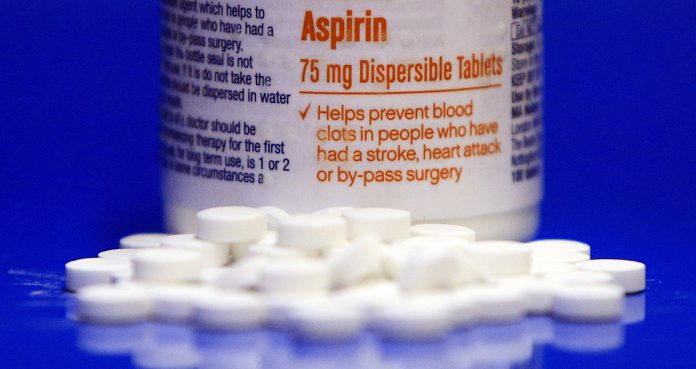A new study, published Wednesday in the medical journal JAMA Network Open, has found that daily low-dose aspirin could reduce your risk of dying from cancer, especially if you are overweight.
Researchers found that taking low-dose aspirin at least three or more times a week is linked to a lower risk of cancer death, with protective effects seen more in people with body mass index (BMI) between 25 and 30.
The study, conducted on more than 146,000 people from 1993 to 2008, found that low-dose aspirin lowered the risk of cancer death by 15 percent, and death from all causes by 19 percent. And those who were overweight had a lower risk of death from gastrointestinal cancer by 28 percent and colon cancer by 34 percent.
Lead researcher Holli Loomans-Kropp said, “Our primary focus was really on colorectal cancer deaths since there’s a lot of evidence to suggest that aspirin use may lower risk of gastrointestinal deaths.”
The study findings support the current guidelines of the US Preventive Services Task Force (USPSTF), which states that people between 50 and 59 should take “low-dose aspirin to prevent colon cancer if they’re not at increased risk for bleeding.”
However, there have been many controversies and debates describing that daily aspirin is not good due to an increased risk of bleeding.
The USPSTF has stated that it continues to recommend daily low-dose aspirin for middle-aged people for heart health even if they have a 10 percent risk of developing heart disease.
The exact role of aspirin in reducing the cancer death risk is unclear, but the researchers said it could be due to the drug’s anti-inflammatory effects.
Loomans-Kropp said, “Gastrointestinal cancers are highly inflammation-associated cancers, and where the strongest effect has been is with the gastrointestinal cancers.”
Eric Jacobs from the American Cancer Society said that there could be a possibility that the blood-thinning effect of aspirin might have a role to play.
He said, “Aspirin may help prevent cancer the same way that it helps prevent heart attacks, which is by blocking the activation of blood platelet cells. We know that activated platelets can release factors that help tumors grow, and activated platelets may also help cancers spread throughout the body.” Jacobs explained that aspirin is not the only way to reduce the risk of colon cancer and that one should maintain a healthy weight by eating a well-balanced diet and exercising. He also said one should quit smoking and limit their red meat intake in order to reduce the risk.























